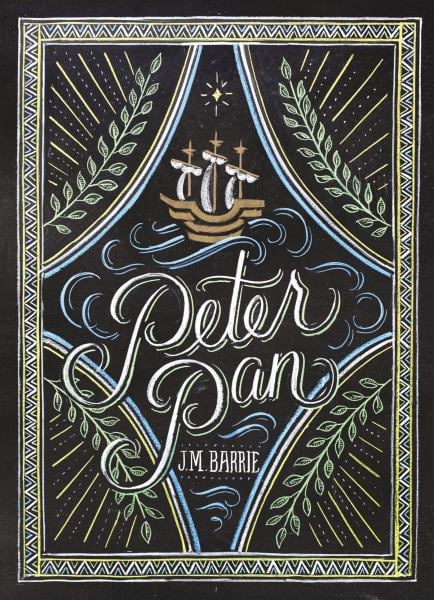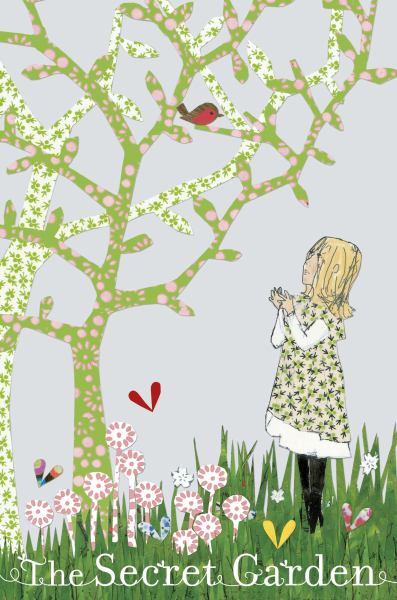This post is part of an earlier installment which you can find here, talking about the importance of adults reading classical children's literature. As a brief recap, though many adults find children's literature to be infantile and immature, many of the themes presented in classic children's literature are better understood by adults and are inappropriate for the modern child. In the last segment, we analyzed the theme of abandonment, death, and abuse in PETER PAN, THE SECRET GARDEN, and WINNIE THE POOH. Today we will be discussing sexuality in PETER PAN and THE SECRET GARDEN.
PETER PAN by J.M Barrie is a great book to study for this theme. The first obvious point of sexuality in the novel is Wendy's role as mother and Peter's attraction to her. This is suggestive of Sigmund Freud's Oedipal Complex. Taken from Socrates' Oedipus Rex - where Oedipus, through a bizarre turn of events, unknowingly kills his father, marries his mother, and has children with her - Freud exemplifies the sexual attraction a son may have for his mother. Freud states that the male son may be jealous of the relationship the father shares with the mother as the mother is a source of comfort and stability for the son. The Oedipal Complex is present not only in Peter's attraction to Wendy, his awe with her specific to her nurturing and motherly traits (telling stories, giving him medicine, fussing), but also in how Peter kills the father figure of the story (Hook). Peter effectively destroys his rival (the father figure) and ensures that he is the sole focus of Wendy's attention and affections.
Hook also presents an interest in Wendy. This is not expressed in an overtly sexual way in the novel but always struck me as slight nefarious. Though in present day, a possible relationship between the two may seem perverse because Wendy is a child of maybe twelve during the novel and he is an adult, this may not have seemed as strange during the Victorian Era, when women often married much older men and could be married at such an young age.
The other small detail that I found while reading the novel as an adult that I could not believe was present was the fact that at some point in the story, Tinkerbell is said to have come back to Peter's hidden tree house from an orgy. While this word may or may not have meant something else during the time at which it was written, it was bizarre to see this in a "children's" novel.
Sexuality is also present in THE SECRET GARDEN by Frances Hodgson Burnett. The Victorian theme of quasi-incestuous relationships is also present in this novel. In THE SECRET GARDEN, Mary (our protagonist) goes to England to live with an uncle she has never met. Through the exploration of her new house she meets Colin, her cousin who has basically been quarantined because of a perpetual nondescript illness. Once the two meet, they form a bond because of their shared loneliness. Throughout the story though, Colin covets Mary and her attention. He becomes jealous of Dickon (their friend) when Mary takes an interest in Dickon's affinity to animals.
--> As a disclaimer, though modern readers may find the relationship between the two cousins disturbing, the marrying of cousins was not altogether inappropriate in England where the aristocracy would marry within the family to maintain titles and wealth.
Read through a lens of sexuality, the two boys can be seen as a symbol of virility and impotence. Dickon, who has a green thumb, has intimate knowledge of the land, and is a healthy and strapping young man, is an obvious representation of virility. Colin, who is sickly, whinny, and emotionally needy, is representative of impotence. Though throughout the story Colin becomes healthy and he too learns about the land, he remains more an intellectual counterpart to Dickon's physicality. Colin experiments with "magic" to see how the land and the animals will be affected while Dickon continues to weed and plant and care for the animals. Furthermore, by the end of the novel, the reader feels that Mary's affections lean more towards Dickon than her cousin.
Despite being children's novels, both novels can be read through a sexual lens and reference interesting concepts like that of Freud's Oedipal Complex and the dichotomy between two characters in their representations of male virility and impotence.
I hope you've found these analyses interesting and that it may have touched upon something that is new to you. If you have any questions or would like to start a discussion, please do so in the comments!
Thanks for reading!
Keep on reading on!
PETER PAN by J.M Barrie is a great book to study for this theme. The first obvious point of sexuality in the novel is Wendy's role as mother and Peter's attraction to her. This is suggestive of Sigmund Freud's Oedipal Complex. Taken from Socrates' Oedipus Rex - where Oedipus, through a bizarre turn of events, unknowingly kills his father, marries his mother, and has children with her - Freud exemplifies the sexual attraction a son may have for his mother. Freud states that the male son may be jealous of the relationship the father shares with the mother as the mother is a source of comfort and stability for the son. The Oedipal Complex is present not only in Peter's attraction to Wendy, his awe with her specific to her nurturing and motherly traits (telling stories, giving him medicine, fussing), but also in how Peter kills the father figure of the story (Hook). Peter effectively destroys his rival (the father figure) and ensures that he is the sole focus of Wendy's attention and affections.
Hook also presents an interest in Wendy. This is not expressed in an overtly sexual way in the novel but always struck me as slight nefarious. Though in present day, a possible relationship between the two may seem perverse because Wendy is a child of maybe twelve during the novel and he is an adult, this may not have seemed as strange during the Victorian Era, when women often married much older men and could be married at such an young age.
The other small detail that I found while reading the novel as an adult that I could not believe was present was the fact that at some point in the story, Tinkerbell is said to have come back to Peter's hidden tree house from an orgy. While this word may or may not have meant something else during the time at which it was written, it was bizarre to see this in a "children's" novel.
Sexuality is also present in THE SECRET GARDEN by Frances Hodgson Burnett. The Victorian theme of quasi-incestuous relationships is also present in this novel. In THE SECRET GARDEN, Mary (our protagonist) goes to England to live with an uncle she has never met. Through the exploration of her new house she meets Colin, her cousin who has basically been quarantined because of a perpetual nondescript illness. Once the two meet, they form a bond because of their shared loneliness. Throughout the story though, Colin covets Mary and her attention. He becomes jealous of Dickon (their friend) when Mary takes an interest in Dickon's affinity to animals.
--> As a disclaimer, though modern readers may find the relationship between the two cousins disturbing, the marrying of cousins was not altogether inappropriate in England where the aristocracy would marry within the family to maintain titles and wealth.
Read through a lens of sexuality, the two boys can be seen as a symbol of virility and impotence. Dickon, who has a green thumb, has intimate knowledge of the land, and is a healthy and strapping young man, is an obvious representation of virility. Colin, who is sickly, whinny, and emotionally needy, is representative of impotence. Though throughout the story Colin becomes healthy and he too learns about the land, he remains more an intellectual counterpart to Dickon's physicality. Colin experiments with "magic" to see how the land and the animals will be affected while Dickon continues to weed and plant and care for the animals. Furthermore, by the end of the novel, the reader feels that Mary's affections lean more towards Dickon than her cousin.
Despite being children's novels, both novels can be read through a sexual lens and reference interesting concepts like that of Freud's Oedipal Complex and the dichotomy between two characters in their representations of male virility and impotence.
I hope you've found these analyses interesting and that it may have touched upon something that is new to you. If you have any questions or would like to start a discussion, please do so in the comments!
Thanks for reading!
Keep on reading on!











No comments
Post a Comment